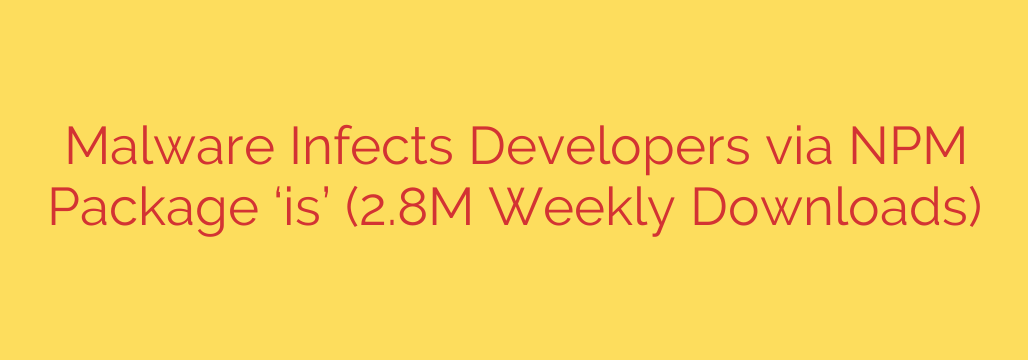
Critical Security Alert: Popular NPM Package Found with Data-Stealing Malware
The developer community is facing a stark reminder of software supply chain vulnerabilities as a widely used NPM package was discovered to contain malicious code designed to steal sensitive information from developer environments. The package, simply named is, boasted an alarming 2.8 million weekly downloads, making it a significant threat due to its widespread integration into countless projects.
This incident highlights a critical security gap in the open-source ecosystem, where the trust placed in popular packages can be exploited by malicious actors.
The Anatomy of the Attack
The malware was embedded within a malicious preinstall script in the package. This type of script is designed to run automatically before the main package installation process begins, making it a powerful and stealthy attack vector.
Once executed, the script’s primary objective was to exfiltrate sensitive information from the developer’s machine. The malware actively scanned for and stole data from various sources, including:
- Discord tokens for account takeovers
- Sensitive browser data, including saved passwords and cookies
- Cryptocurrency wallet files
- Environment variables that could contain API keys, secrets, and other credentials
This stolen data was then transmitted to a remote server controlled by the attacker, likely using a Discord webhook for easy collection. The compromise of this information could lead to severe consequences, from financial theft to unauthorized access to corporate networks and proprietary source code.
A Growing Trend: The Vulnerable Supply Chain
This attack is not an isolated event but part of a larger, concerning trend of targeting developers through the software supply chain. Attackers are increasingly using techniques like typosquatting (creating packages with names similar to popular ones) and dependency confusion (tricking build tools into downloading a malicious internal package instead of a public one).
The generic name of the is package made it particularly deceptive. Developers could easily add it to a project, believing it to be a legitimate and harmless utility, without realizing its malicious intent. The sheer volume of downloads demonstrates how quickly a compromised package can propagate through the ecosystem.
How to Secure Your Development Workflow
While the malicious versions of the is package have been removed from the NPM registry, the underlying threat remains. Developers and organizations must adopt a more proactive and defensive security posture. Here are essential steps to protect your projects and infrastructure:
Audit Your Dependencies Regularly: Do not blindly trust packages, regardless of their popularity. Regularly review your project’s dependencies, including transient dependencies (dependencies of your dependencies). Question the necessity and origin of each package.
Utilize Lockfiles: Always use and commit lockfiles (
package-lock.json,yarn.lock). Lockfiles ensure that you are using the exact version of a dependency that you have tested and vetted, preventing unexpected or malicious updates from being installed automatically.Vet New Packages Carefully: Before adding a new dependency, perform due diligence. Check its download history (look for sudden, unexplained spikes), the activity of its maintainers, its GitHub repository, and its open issues. Be especially wary of packages with generic names, sparse documentation, or a lack of community engagement.
Implement Automated Security Scanning: Integrate security scanning tools directly into your CI/CD pipeline. Tools like
npm audit, Snyk, or GitHub’s Dependabot can automatically check for known vulnerabilities in your dependencies and alert you to potential threats before they reach production.Isolate Build Environments: Whenever possible, run build and installation processes in isolated, containerized environments with restricted network access. This can limit the potential damage a malicious script can do by preventing it from accessing sensitive data on the host machine or corporate network.
The security of the open-source software supply chain is a shared responsibility. By remaining vigilant and implementing robust security practices, developers can better protect themselves and their organizations from these evolving threats.
Source: https://www.bleepingcomputer.com/news/security/npm-package-is-with-28m-weekly-downloads-infected-devs-with-malware/








